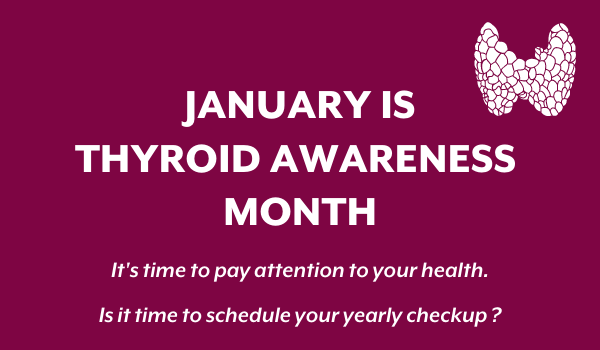In this new year, we want to remind you to take care of yourself. With all of the talk and concern about the COVID-19 virus, it’s a very confusing time. One important thing you can do is to pay attention to your health.
January is Thyroid Awareness Month. What an appropriate time to call attention to the various health concerns connected to the thyroid. We’ve gathered information in this column to help you learn more about the most common thyroid conditions. Most of us have heard about the thyroid, but we may not realize its importance. If you have questions about thyroid diseases or any other concerns, we urge you to visit your healthcare provider.
What Is The Thyroid?
The thyroid gland is located in your neck just below the Adam’s apple. It may be small, but it has a significant impact on your health, controlling your metabolism and creating new proteins. This butterfly-shaped gland is part of the endocrine system, directly affecting almost every organ in the body. It is responsible for regulating skin integrity, menstrual cycles, calcium levels, and the nervous system, heart and cholesterol levels. In addition, it controls brain development, your body temperature, respiration, metabolism and fat production.
Thyroid problems begin to occur when the thyroid gland produces too much hormone or not enough. There are several illnesses and diseases related to the thyroid, including hyperthyroidism, hypothyroidism, Hashimoto’s disease, Graves’ disease, goiter and thyroid cancer. We will address the two main thyroid conditions: hypothyroidism and hyperthyroidism. Each has an opposite set of symptoms.
Hypothyroidism, when the thyroid is working more slowly than it should, is most common in patients over 60, and the incidence of this disease increases with age. People with hypothyroidism tend to experience weight gain, irregular menstrual cycles, slow heart rate, muscle aches, constipation, voice changes and the loss of body hair.
Conversely, Hyperthyroidism is where your thyroid works more actively than it should. Hyperthyroidism is most common in patients under age 50 and is marked by an enlarged thyroid gland, plus insomnia, a rapid heart rate, anxiety, weight loss, increased appetite, emotional instability, increased nervousness and anxiety, excessive perspiration, and diarrhea. The senior hypothyroidism patient may only have one or two of these symptoms. Although hyperthyroidism is associated with more energy, the body breaks down after a while, leading the person to feel more tired.
What causes the thyroid to malfunction?
Most thyroid malfunctioning is caused by an autoimmune response. The immune system of someone with hypothyroidism sees the thyroid as a threat and begins to attack it, causing inflammation and damage, leading to a decrease in hormone production. The immune system of someone with hyperthyroidism compels the thyroid, unnecessarily, to over-produce hormones.
A prevailing theory behind why women are more susceptible to thyroid disorders is because the female immune system is more pliable than the male immune system, capable of revving up or winding down in response to certain biological events, specifically pregnancy. When a woman becomes pregnant, the baby is seen as a foreign object in the body. To prevent the growing fetus from being damaged, the mother’s immune system must be suppressed.
The only way to know for sure if you have thyroid disease of any type is to have a blood test that measures your thyroid hormone levels. To confirm whether there is a thyroid concern, your physician may perform a thyroid-stimulating hormone test. This blood test measures whether the gland is working properly. It is highly recommended to get tested if you are a senior over 60, have family members diagnosed with the disease or believe you have symptoms.
Diagnosing thyroid disease in seniors can be difficult because some of the symptoms are also associated with aging or other medical conditions. It is natural to assume symptoms such as memory issues, constipation or weight gain are part of the aging process. However, these can also be signs of thyroid disease.
Causes & Treatment Of Thyroid Diseases
There are several causes, but some common causes can be attributed to autoimmune disease, certain types of medications, thyroid surgery or radiation therapy. Anyone can develop thyroid problems, but women age 60 or older seem to be more susceptible.
Hypo- and hyperthyroidism can be treated with medication, iodine, or hormones, and the other conditions can be addressed with therapy or surgery. Luckily, thyroid prescriptions can usually get symptoms under control. It is important to keep abreast of new symptoms that may occur because medications may need to be changed or dosages increased or decreased. It is also critical to be sure to take medication at the same time every day.
The nonspecific nature of symptoms can make thyroid conditions challenging to diagnose. If you feel you may be having problems with your thyroid, your best option is to bring your concerns to your primary care physician’s attention.
If you have questions, the healthcare professionals at our Internal Medicine Practice can help.
Call 307-675-2650 to schedule an appointment today.

